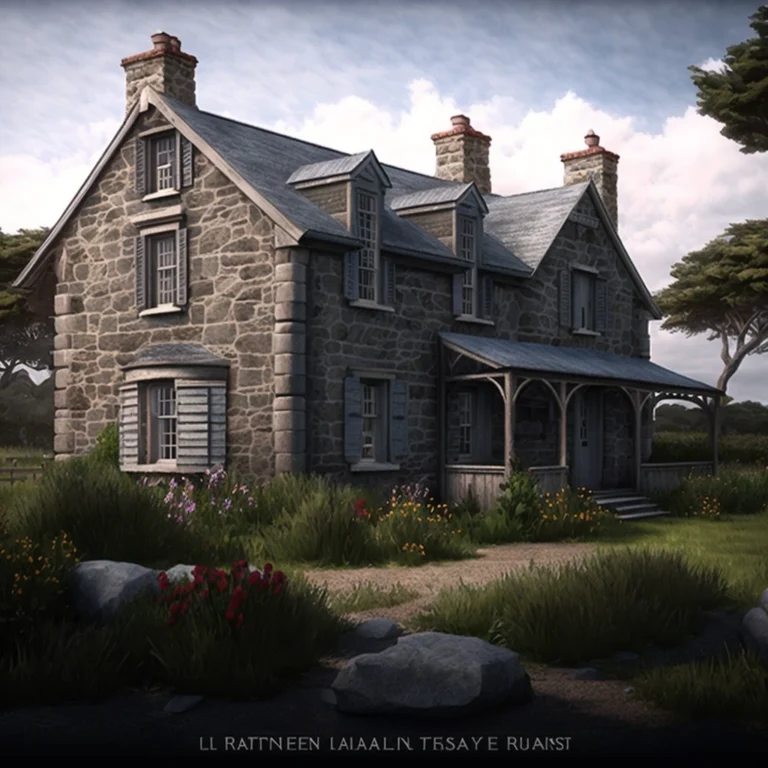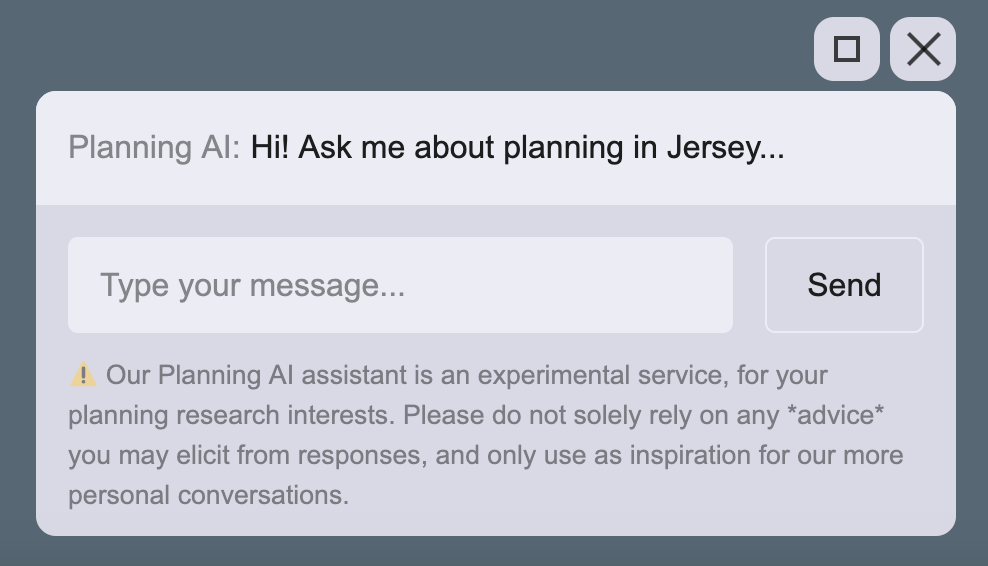
Welcome to the future — chat with public information!
If you haven't yet seen our ChatGPT-powered Planning AI assistant, please give it a try — it's free!
Just click on the chat icon on the bottom-right of this site to see this chat window, and use the square icon to maximise the space on mobiles.
As the first of many uses of AI we're building, it brings innovation, accessibility, and lower costs to all areas of property planning research.
How does Planning AI work?
We've trained our Planning AI chatbot to know all you need to discuss your Jersey planning permission and application queries. Behind the scenes, this means detailed prompt context, and embedding supplementary training data.
It has already learned from public information, including from the gov.je, jerseylaw.je, and jerseyheritage.org websites, for reference to primary sources — similar to the way search engines work, but a little smarter in the responses.
It is contextually aware of the Jersey Planning and Building department pages, and Jersey Architecture Commission‘s insights and guidance — so do test its knowledge on all things related to Jersey planning, so far.
You could find the same information by searching and reading everything directly or via search engines, web archives, and the library (which we certainly hope it doesn't replace), but this new way of researching this information is more like having your own personal planning consultant available around the clock, for free.
What can AI do for property planning?
You can now also use AI to chat with information, using natural language queries and requests to become full conversations. It can analyse and summarise these vast amounts of information, in a way that can be useful for our preliminary needs to understand a given topic.
It can't give you specific personal advice, but it can help you ask the right questions to get more thorough and direct advice.
Furthermore, it can even help you write letters, emails and all manner of documents, rather quickly. Just give it a brief, and ask for refinements until you're happy.
Of course, we asked it not to get mixed up with “New Jersey” — but as new technology, just bear in mind that almost anything is possible.
Being just one alternative tool available to you, among many, we always recommend reference to the original source of information. You can even ask it for a critical analysis of information, and comparison to other jurisdictions, if you're interested.
What can you do with our Jersey Planning AI?
We have trained it to return direct reference links, where available. Although, if no links are included, that doesn't mean they don't exist — just copy-paste the relevant terms into multiple search tools, to see what else might present itself.
By definition, Large Language Models (LLM) compute answers by probability, as a next-sentence generator, following prompts. These prompts can be questions, requests, briefs or entire projects.
Deeper than just analysing and returning words, it understands meaning, context and comparison — similar to how a well-read expert on a given subject might call upon a variety of experience and information from multiple sources. Try asking it to play a particular role, or suggest what questions you might also find useful to ask.
It's not conscious, just very adept at analysing large amounts of information — as there often is in laws and policies.
AI is for accessibility of information to all
This can now make public information more accessible and meaningful to all that need it — not just those that could afford the research, analysis time and consultants.
Then, if you do need a consultant, you can be more specific and time-efficient, having already researched and understood a project from a high-level, and be ready for more specific questions.
Our wish and mission is to provide technologies that make public services — and the information necessary for progress — more usable and, ultimately, affordable for all.
Administration and communications all have time and money costs, taken from what we have left for materials and labour. So, we hope that the efficiency we can add to processes will liberate that time and money to invest more in the improvement of all properties and our local environment.
To these aims, we are funding and evolving these new tools.
From this increased capability and understanding for all, we can further provide supporting services, AI developments, and collaborative improvements.
So, let us know your feedback and suggestions, for what we can make easier, quicker and more efficient in your planning needs.
Let's ask Planning AI what it thinks
Here are some questions we've asked our Jersey Planning AI Assistant, for your inspiration:
Let's start with a common question…
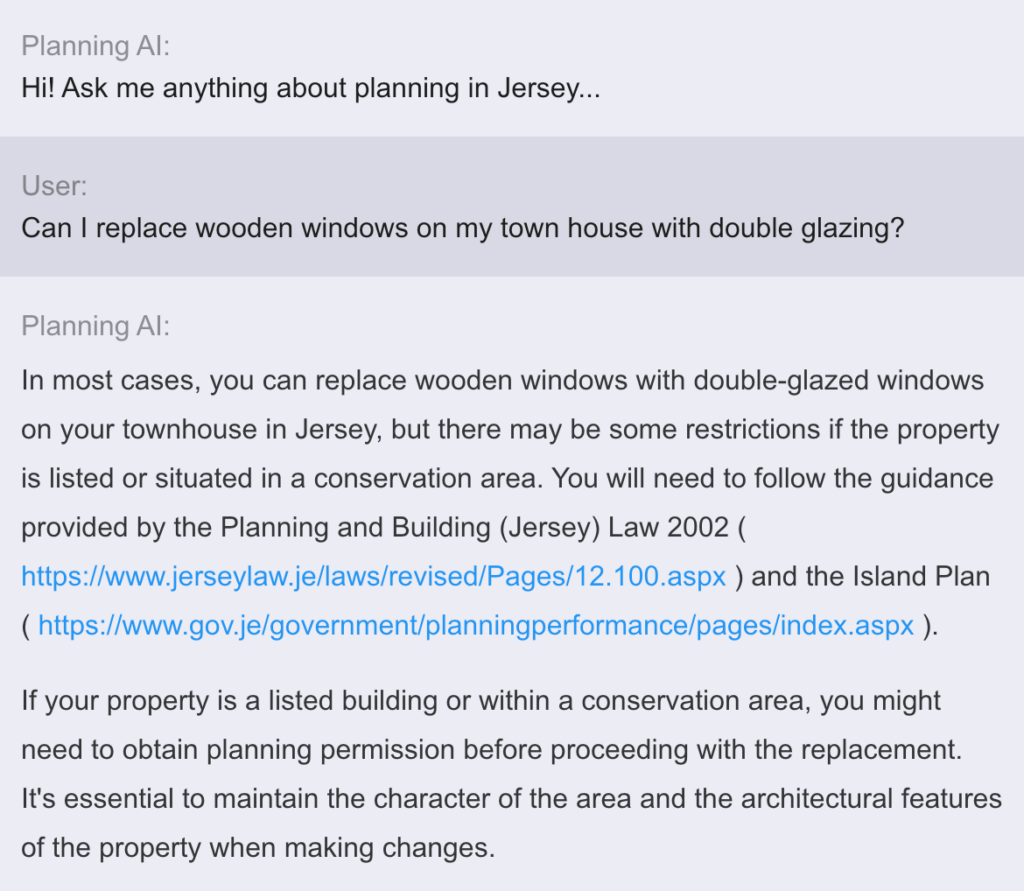
So far, so good. Now let's get a little more challenging…
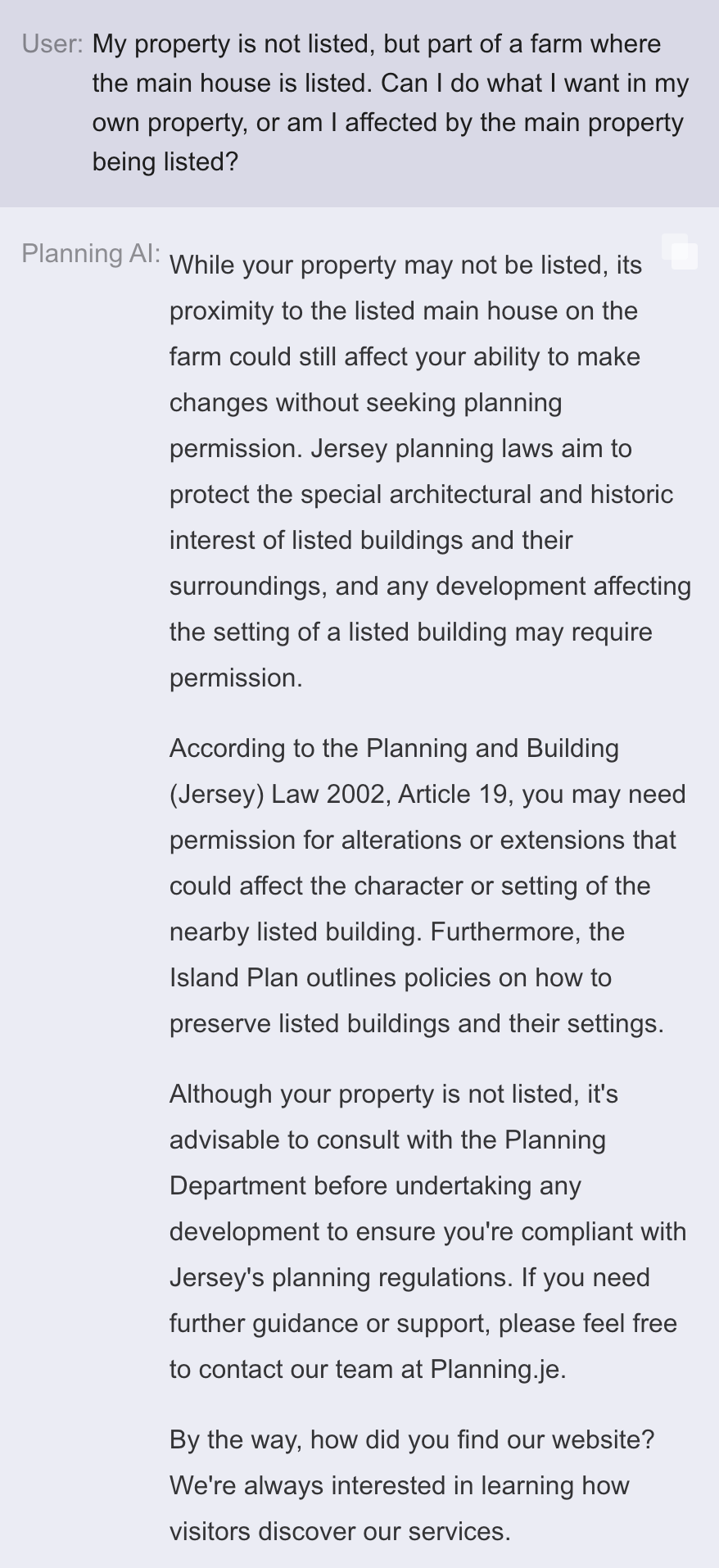
OK. Let's try a political question…
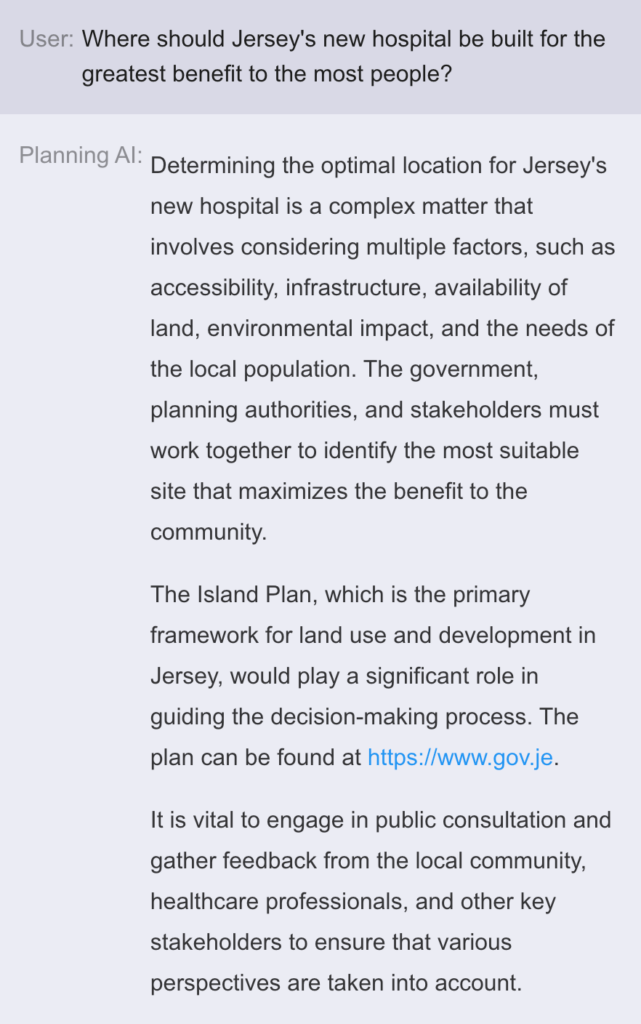
Interesting, not untrue? It's quite the diplomat!
You really can ask AI anything!
Try it in Jèrriais!
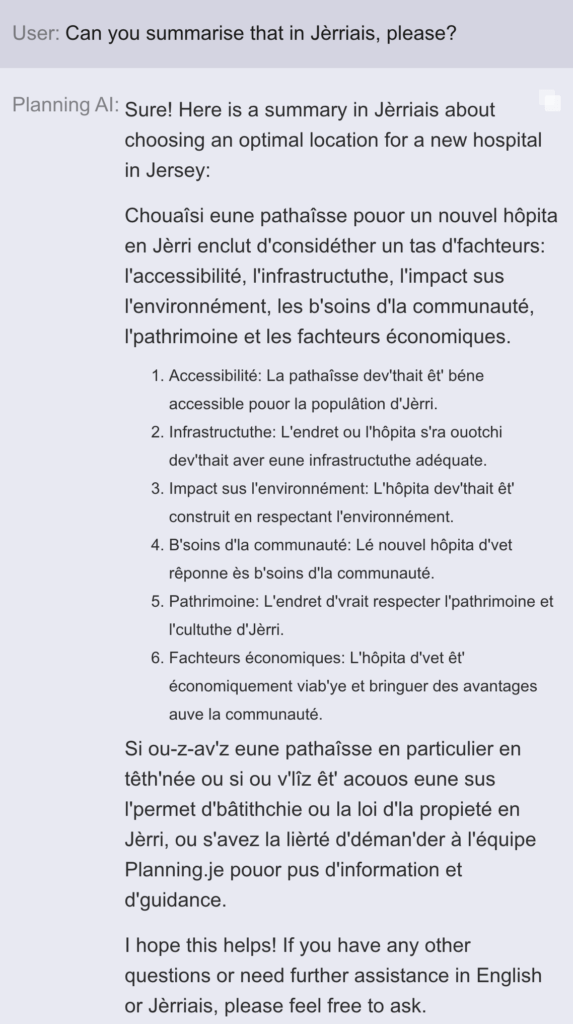
Wow! We do hope this can also be an inspiration for people of all ages to try learning new languages, and more of our cultural heritage.
Try asking it to translate, or answer in, any language.
This really does help democratise research, where English as a 2nd language should no longer be a barrier to public information and services.
Is AI safe?
We have implemented some moderation, and subject-focus training — so, for anything outside the scope of the subject of our website and Jersey property planning services, you will need to try one of the other public interfaces for AI chat, like chat.openai.com, bing.com, you.com, neeva.com, etc.
We're certainly excited to see the capabilities, so far — and will continue our research and development, for the many more possibilities we see to come.
For those interested in conversations about our research, collaborations in other areas of society, anything we might also be able to inspire efficiency with new these tools, or anything else related to Planning and AI, please do book a call to discuss.
How about AI images?
Yes, we're working on those, too. It's early research, but we're sure you'll agree the results so-far are interesting.
Here's what we get from asking AI to generate images of traditional Jersey granite home front-doors:
And with a different model, we can create more artistic renders of what a Jersey house might look like in the metaverse:
None of these buildings and doors actually exists, but the ability to create so many recognisable permutations, so quickly, is certainly getting us thinking.
What else could AI help solve?
The same can be done in reverse, too — upload an image, and receive a detailed text description of its content.
It works for mapping data, too. Another area where the volume of information can otherwise be prohibitive for studying and questioning.
AI is already revolutionising scientific study and medical care — and now we are starting to see general availability to all industries, where it can provide access to things that were prohibitively expensive or time-consuming, before.
Planning permission is certainly an area many of us are aware of — specifically, conversations on the potential for costs, difficulties, and controversy.
Uncertainty, and just the time it takes to make progress on any project, can be prohibitive, and expensive — often with further negative opportunity-costs and externalities.
These are all barriers to progress in improving living standards, the environment and society for all. They are problems that public services, service users, and technology services all need to work together to solve — for the ultimate public goods we share, rights we protect, and freedoms we promote.
Perhaps this is the first step in reclaiming our collective ability to create and preserve beautiful buildings for all.
Perhaps we can now have a new renaissance, with every part of society being able to afford, and be offered, homes built to live in, that are as well-structured and designed as our ancestors were able to.
Buildings are the ultimate reflection, projection, and legacy of every society and its cultural values.
Let's rediscover what we're capable of, when we can recover more time and resources for the ambition of our plans, and the quality of our buildings.
Our Planning AI roadmap
We're seeing AI tools evolve by the day, as each developer now has AI an AI coding companion that can build almost as fast these AI-assisted the creators can imagine.
For us, this gives us the capabilities to solve problems that used to take many more people and and resources to be achievable, and make proof-of-concept work almost as quickly as writing the brief. In fact, AI can also write the project plans, and analyse the work as we go for risks and improvements.
All of this only matters to anyone, if we can solve real-world problems, which is why we're applying these capabilities to one of the most notable processes that can benefit from increasing the quality and bandwidth for communications, analysing the options, and making progress more accessible for the positive economic movement, in protecting, restoring and building, that it can then enable.
2023 Q3
Launch Planning.je for open public beta-testing, consultation with partners and services, and gathering feedback to refine the website and primary services benefitting from AI efficiencies in analysis and processing.
2023 Q4
OpenAI's GPT-4 training data cut-off is 2021. This means more recent information needs training with embedded content from more recent public information sources, using plug-ins and fine-tuning from initial feedback.
Building AI agent workers to autonomously analyse, process and share insights, through our published articles, and private services.
2024
Imagery analysis and training, based on our services and information gathered so-far, to expedite processing times for planning permission reviews.
This area could get detailed and complicated to implement, so further announcements based on preliminary research will be made as we progress.
We do have AI assisted development, too — so progress is accelerating.
GPT-5 is currently forecast to be launched in December 2023. You can be sure we will have early access, and bring further news of the capabilities it can offer.
The future
It is apparent, already, that AI is going to form an integral part of our future, for delivering and receiving public and private services — and many things beyond our current imagination.
We're ready, and already using AI in practical ways to design, build and evolve the technology platforms and services we can offer.
The best way to learn anything new, is to try it in a safe environment. Please let us know how you get on — and contact us to share your planning and AI stories.
All services
If you found that interesting, please have a look at some of the other services we offer:
- 3rd-Party Condition Reports 📄
- Development Site Finder 📍
- Floorplans, 3D Imagery and Printing 📐
- Planning Permission Applications 📑
- Public Services & Press 📰
- Requests for Quotations (RFQs) 📄
- Trade Partner Services 📇
- Valuations for Planning Permission 💷
Contact us humans
Still got questions, or have something to share?
Please, message us here at anytime, and we'll endeavour to get back to you the same or next day:




